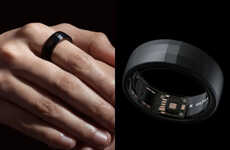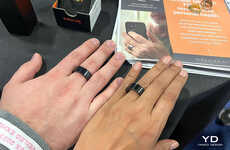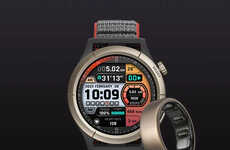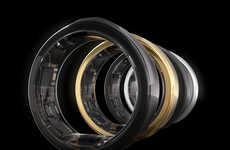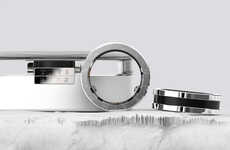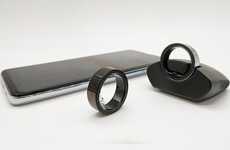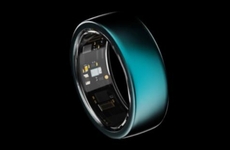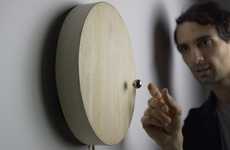
Motiv Measures The Time You Spend Activity Moving Over Distance
Alyson Wyers — October 1, 2017 — Fashion
References: techcrunch
This fitness ring from Motiv, according to TechCrunch, could potentially represent "the beginnings of liberation from the tyranny of the wrist." Although a ring has less room for a battery and nixes a display, the discreet and capable design is still able to carry out the basic functions consumers are looking for in a wearable fitness tracker.
Made out of titanium, the device is lightweight with two sensors: a heart rate monitor and an accelerometer. These enable the fitness ring to monitor the wearer's active and resting heart rate, calories, distance, sleep time and steps. The accompanying Motiv app measures things in active minutes, changing the focus from the distance you have traveled to the amount of time you spend moving.
Made out of titanium, the device is lightweight with two sensors: a heart rate monitor and an accelerometer. These enable the fitness ring to monitor the wearer's active and resting heart rate, calories, distance, sleep time and steps. The accompanying Motiv app measures things in active minutes, changing the focus from the distance you have traveled to the amount of time you spend moving.
Trend Themes
1. Discreet Wearable Fitness Rings - The trend of wearable fitness technology is moving away from wrist wearables towards discreet and capable designs such as fitness rings for users looking for basic tracking functions like heart rate monitoring, sleep tracking, etc.
2. Activity-focused Fitness Trackers - The trend in fitness tracking is moving from traditional distance-based measurements towards activity-based measurements, putting a greater focus on the time spent on movement instead of the distances travelled
3. Smart Material Use in Wearables - There is increasing focus on the use of smart materials such as titanium to make wearables lighter, more durable and discreet
Industry Implications
1. Health and Fitness - Fitness rings present an opportunity for the health and fitness industry to offer a new type of wearable offering discreet basic tracking functions such as heart rate monitoring, calories burned, steps taken, etc.
2. Wearable Technology - Wearable technology companies can take advantage of the trend towards more discreet activity-tracking wearables and explore the use of smart materials like titanium for making wearables more durable and long-lasting
3. Materials Science - The popularity of wearables and the need for lighter, more durable materials presents an opportunity for materials science companies to explore new smart materials like titanium for use in wearable technologies
6.6
Score
Popularity
Activity
Freshness


